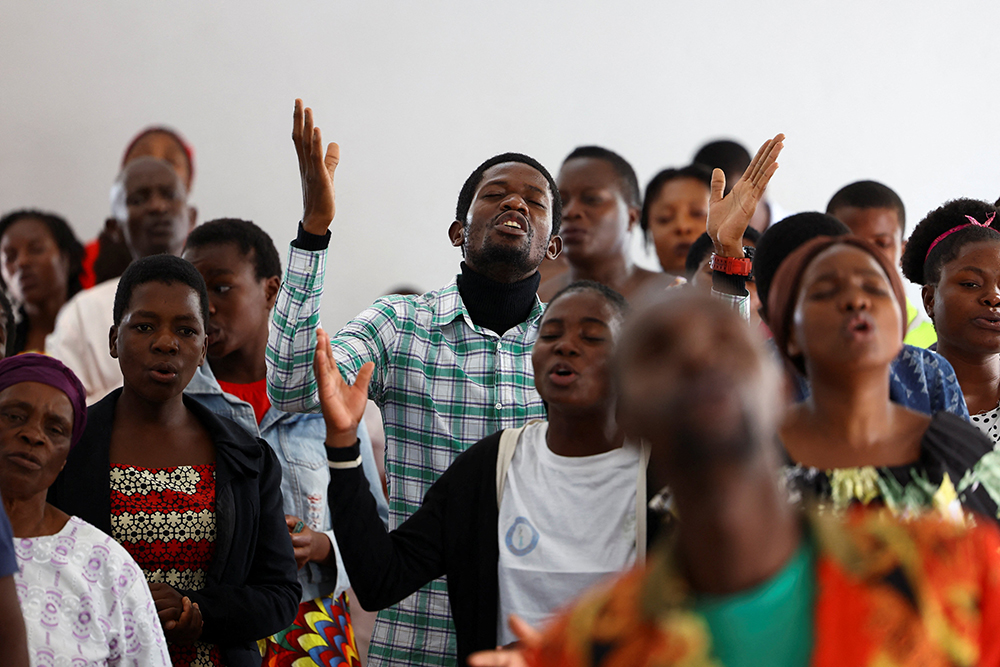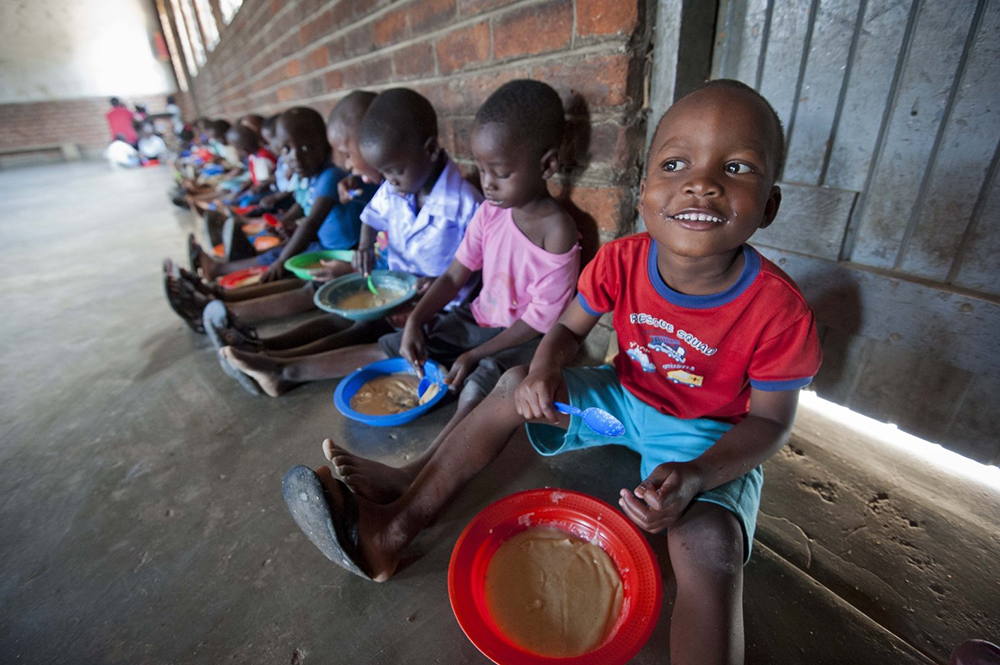
Congregants pray at a church in Blantyre, Malawi, March 19, 2023, during a service for flood victims after severe flooding and mudslides during Cyclone Freddy. (OSV News/Reuters/Esa Alexander)
Catholics in the drought stricken African nation of Malawi say the August visit to the Vatican by the country's president, Lazarus Chakwera, reflects the importance of faith and the role that the church can play ahead of the country's elections and as it looks for much needed aid but they also want to hear more about what was discussed.
Malawi, a country of 20.4 million, is among the poorest countries in the world. According to the World Food Program, 5.7 million people in Malawi "will face acute food insecurity" between October 2024 and March 2025.
Catholics make up about 17.2% of the country's total population which is 77% Christian.
Catholic Charities and other relief agencies such as Catholic Relief Services, Caritas, Oxfam and others have been stepping up food aid programs. Chakwera, a former theology instructor, visited Francis at the Vatican Aug. 19 where he also met Cardinal Pietro Parolin, Vatican secretary of state and Archbishop Paul Richard Gallagher, secretary for relations with states and international organizations.
Advertisement
Many Catholics in Malawi have however been having mixed feelings regarding Chakwera's visit. Fr. Petros Mwale, priest at St. Martin De Porres Parish in the Mzuzu Diocese in Malawi, said it was significant as it "reflects the importance of faith in Malawi, where the majority of the population identifies" as Christian with a sizable number of Catholics.
"The visit may aim to strengthen diplomatic ties between Malawi and the Holy See, potentially leading to increased cooperation on issues like education, health care and social justice," he told the National Catholic Reporter.
Malawi is heavily reliant on donor financing for its development programs, with approximately 70% of its public health care funding coming from donors.
Chakwera said in a statement after meeting Francis that the two had discussed "the progress of bilateral relations" between Malawi and the Holy See. The Vatican statement similarly said that Francis and the Malawian leader had discussed possible collaborations.
Malawi will hold elections Sept. 25, 2025, and Chakwera will be seeking re-election. One of his opponents in the 2025 election is the country's former president, Peter Mutharika, who has just been endorsed by the main opposition Democratic Progress Party as its presidential candidate.
Malawi's run-up to the 2025 election has been marred by bitter disputes and protests over corruption and governance issues related to the handling of voting preparations.

Children are pictured in a file photo eating food provided by Mary's Meals at a center in Malawi. Pope Francis addressed the U.N. Food and Agriculture Organization Oct. 16, 2020, World Food Day. (CNS/Courtesy of Chris Watt)
Mwale said relations between the Catholic Church and the government in Malawi have historically been collaborative, with the church playing a significant role in providing social services and promoting moral values.
However, he said, "there have been instances of tension, particularly when the church speaks out against governance issues like corruption, human rights abuses, and poor leadership" which often stoked tensions.
"The church's prophetic voice has sometimes put it at odds with the government, but this also demonstrates the church's commitment to promoting justice and accountability. The visit provided an opportunity for the president to discuss pressing governance issues with the pope, such as corruption, poverty, and human rights," the priest said.
Other Catholics in Malawi said Chakwera's visit should have involved local Catholic bishops. Earlier this year, Catholic bishops in Malawi criticized Chakwera's government for not prioritizing the lives of ordinary Malawians.
They said they had repeatedly warned the government leadership that continued poor governance would result in increased poverty.
"While our efforts to engage the government leadership have been largely unsuccessful, as Christians, we keep trying, hoping for change at some stage. Most Malawians, except the very few well-connected ones, feel strongly that there is nothing else they can do to turn around the country or improve the deteriorating living conditions," the country's bishops said in a February 2024 pastoral letter.
"The church's prophetic voice has sometimes put it at odds with the government, but this also demonstrates the church's commitment to promoting justice and accountability."
— Fr. Petros Mwale
Fr. Edmond Nyoka, parish priest at St. Teresa in the Mzuzu Diocese, said there had been "no statement from the church" regarding Chakwera's visit to the Vatican.
"I have very little details of the trip. I am not sure why he went there, whether he was invited or he booked through the foreign ministry," the priest told NCR.
Although the Catholic Church is seen as highly influential in Malawi given its significant following and a strong institutional presence that includes relief and aid agencies, Mwale said the church's influence also extends beyond spiritual matters to governance and accountability.
"The church has been vocal on issues like corruption, electoral reform and human rights, using its moral authority to promote positive change. Additionally, the church's development initiatives and social services have contributed significantly to the country's development," he said.
He also said the church's influence in Malawi lately has been "limited by factors like political resistance" particularly amid worsening poverty and droughts.








